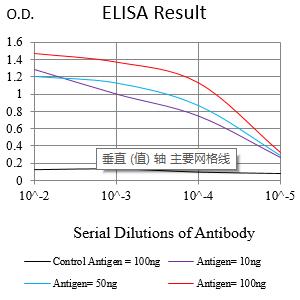
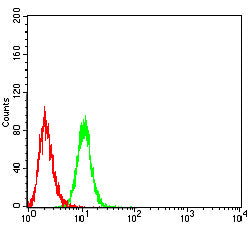
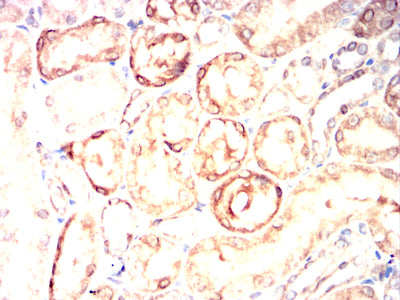
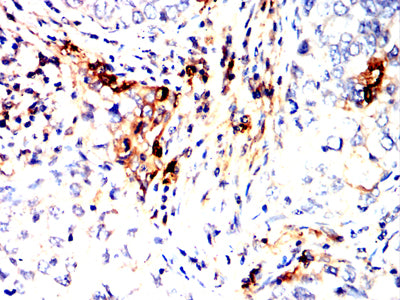
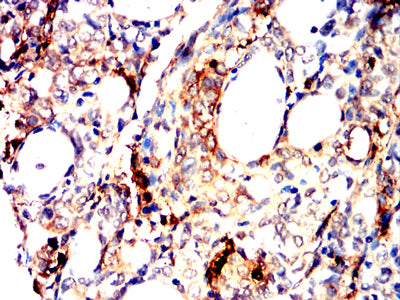
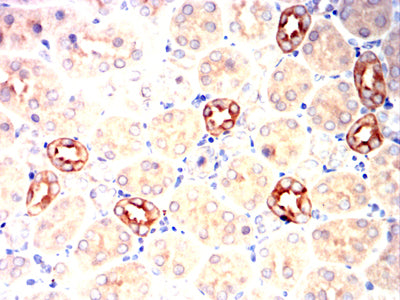
| WB | 咨询技术 | Human,Mouse,Rat |
| IF | 咨询技术 | Human,Mouse,Rat |
| IHC | 1/200 - 1/1000 | Human,Mouse,Rat |
| ICC | 技术咨询 | Human,Mouse,Rat |
| FCM | 1/200 - 1/400 | Human,Mouse,Rat |
| Elisa | 1/10000 | Human,Mouse,Rat |
| Aliases | TPS1; TPS2; TPSB1; TPSB2; Tryptase-2 |
| Entrez GeneID | 7177 |
| clone | 6B6B12 |
| WB Predicted band size | 30.5kDa |
| Host/Isotype | Mouse IgG2b |
| Antibody Type | Primary antibody |
| Storage | Store at 4°C short term. Aliquot and store at -20°C long term. Avoid freeze/thaw cycles. |
| Species Reactivity | Human, Rat |
| Immunogen | Purified recombinant fragment of human TPSAB1 (AA: 31-275) expressed in E. Coli. |
| Formulation | Purified antibody in PBS with 0.05% sodium azide |
+ +
以下是关于TPSAB1抗体的3篇参考文献概览:
1. **文献名称**:*"Development of a monoclonal antibody specific for human β-tryptase"*
**作者**:Schwartz LB, et al.
**摘要**:该研究开发了一种针对人β-类胰蛋白酶(TPSAB1编码)的单克隆抗体,验证了其特异性及在肥大细胞相关疾病(如肥大细胞增多症)中的诊断应用,为临床检测提供工具。
2. **文献名称**:*"Tryptase genetics and anaphylaxis"*
**作者**:Lyons JJ, et al.
**摘要**:探讨TPSAB1基因拷贝数变异与肥大细胞活化疾病(如遗传性α-类胰蛋白酶增多症)的关联,利用特异性抗体分析类胰蛋白酶水平,揭示其在严重过敏反应中的潜在机制。
3. **文献名称**:*"Serum tryptase levels in systemic mastocytosis"*
**作者**:Valent P, et al.
**摘要**:研究通过TPSAB1抗体检测血清类胰蛋白酶水平,证实其在系统性肥大细胞增多症(SM)诊断中的临床价值,并建立其作为疾病活动性和预后的生物标志物。
TPSAB1 (Tryptase Alpha/Beta 1) is a gene encoding a member of the tryptase serine protease family, predominantly expressed in mast cells. The enzyme it produces, β-tryptase, is stored in mast cell secretory granules and released upon activation, playing a critical role in inflammatory and immune responses. TPSAB1 antibodies are tools used to detect and quantify β-tryptase, aiding in research and diagnostics related to mast cell disorders.
Functionally, β-tryptase contributes to tissue remodeling, pathogen defense, and allergic reactions by cleaving extracellular matrix proteins and activating protease-activated receptors (PARs). Elevated β-tryptase levels are biomarkers for systemic mastocytosis, mast cell activation syndrome (MCAS), and severe allergic reactions. TPSAB1 antibodies are employed in immunohistochemistry, ELISA, and flow cytometry to identify mast cell populations, assess degranulation, and differentiate between normal and pathological states. They also help distinguish β-tryptase from the less common α-isoform (encoded by TPSA2), which lacks enzymatic activity.
Notably, TPSAB1 gene duplication or gain-of-function mutations are linked to hereditary α-tryptasemia (HaT), a condition associated with multisystem symptoms. Research using these antibodies enhances understanding of mast cell biology and therapeutic targeting in allergies, asthma, and mastocytosis. Their specificity and reliability make them vital for both clinical diagnostics and mechanistic studies.
×